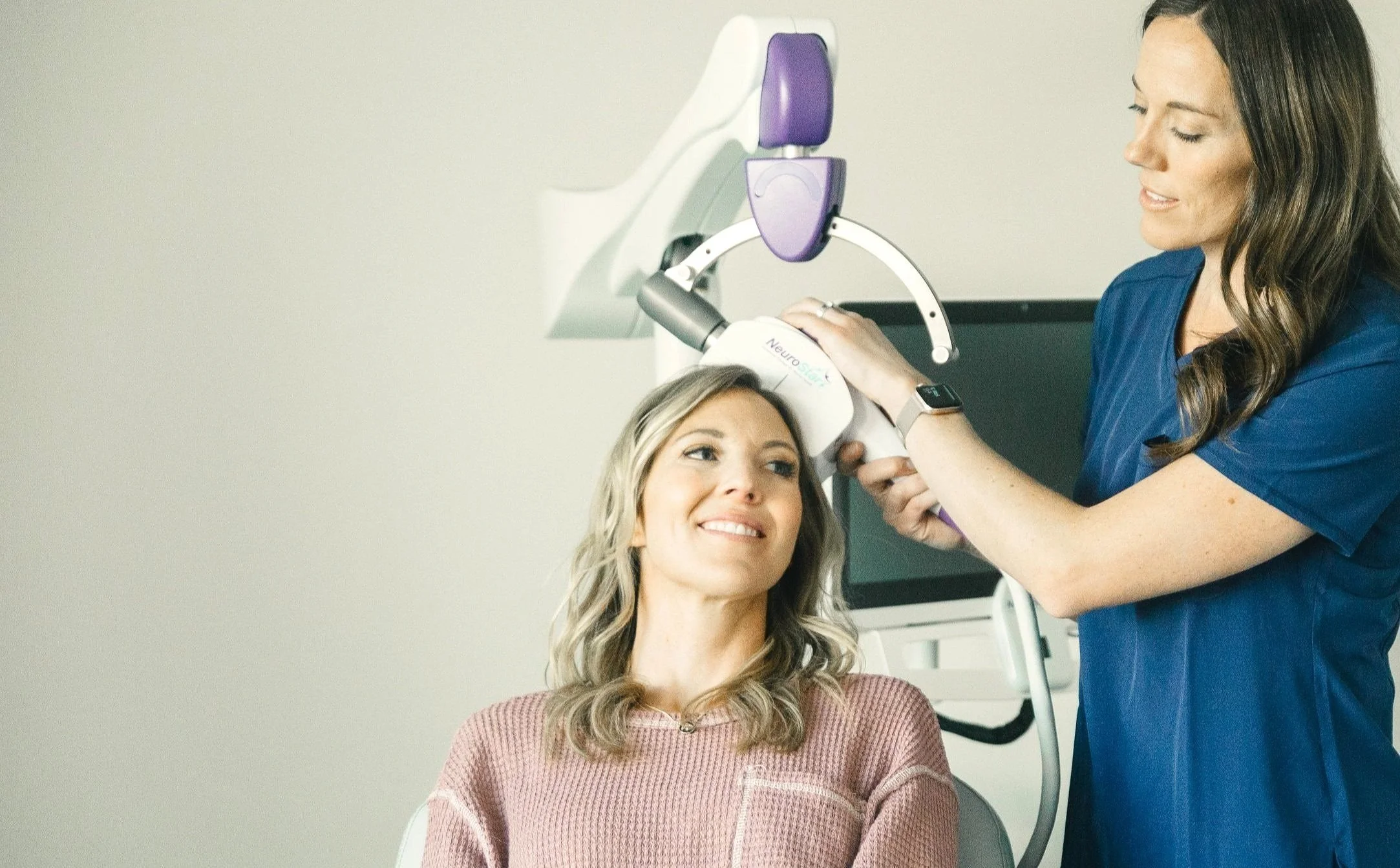
Transcranial Magnetic Stimulation
(TMS) offers a promising, non-invasive treatment option that brings new hope to those struggling with depression and other mental health conditions.

Transcranial Magnetic Stimulation (TMS) is a non-invasive therapy that uses magnetic pulses to stimulate the prefrontal cortex, or the mood centers of the brain. It’s the most effective treatment for depression/anxiety available today—especially when traditional medications haven’t provided enough relief. The research is so compelling that most insurance plans are now covering it, making it far more accessible to people who need it.
It’s helpful to think of TMS like physical therapy for the brain. We administer magnetic pulses to stimulate neuroplasticity, your brain’s natural ability to form new, healthier connections. After a few short weeks our clients begin to notice improvements in a variety of ways: a desire to call that friend, go on a walk, or take up their favorite hobby again. Over time, TMS helps "retrain" the brain’s emotional regulation pathways, improving mood, clarity, and balance in a safe and drug-free way.
What is TMS?
Your story is not over yet.
Reach out today and we can walk you through the next steps.
How does TMS work?
TMS uses focused magnetic pulses—similar to those in an MRI machine—to reignite underactive or “dormant” synapses in specific areas of the brain. During a session, a small coil is placed gently against your scalp. It delivers magnetic pulses that pass through your skull to stimulate the brain regions involved in mood regulation. While you can feel the pulses, the treatment should not be painful in any way.
By reactivating these pathways, TMS helps regulate brain activity, which can restore healthier brain function and reduce symptoms of conditions like depression.
Benefits of TMS
TMS is covered by most insurance plans
Non-invasive and medication-free
No systemic side effects like weight gain or fatigue
Improves mood, focus, and emotional resilience
Promotes lasting changes in brain function through enhanced neuroplasticity
Convenient, in-office treatments with no downtime—you can return to daily activities right after
A typical treatment course for TMS consists of 5 treatments per week over a 7 week period. Each treatment typically lasts 19 minutes.
You will sit comfortably in a chair, a small magnetic coil will be positioned on your head, and the treatment will begin. You will hear a clicking sound and feel a tapping sensation on your head. Afterwards, you can resume normal activities immediately.
TMS offers a hopeful path forward—helping your brain function the way it was meant to, with greater balance, strength, and clarity.
For more information about NeuroStar, please visit
Treatment Process

FDA-Cleared TMS Treatment
NeuroStar TMS is a non-invasive, FDA-cleared therapy for depression, anxious depression, and OCD as an adjunct therapy, offering a medication-free treatment option. TMS is now FDA cleared for anyone ages 15+.
Depression
OCD
Anxious Depression
Frequently Asked Questions
-
TMS is an FDA-cleared, non-drug, non-invasive treatment for people suffering from depression who are not satisfied with the results of antidepressant medications. TMS utilizes targeted electromagnetic pulses to stimulate areas of the brain that are underactive in people suffering from depression, anxious depression, and OCD.
-
TMS treatment is covered by many insurance plans, including Medicare, for patients who meet specific criteria, typically those diagnosed with depression that has not responded to traditional treatments. At NeuroWellness, we work closely with you to navigate the insurance process, providing assistance with pre-authorization and helping to clarify your coverage details.
We recommend contacting your insurance provider directly to confirm your eligibility for TMS coverage, and our staff is here to support you with any required documentation or information needed to facilitate this process.
-
Transcranial Magnetic Stimulation (TMS) has been FDA-cleared as a safe and effective treatment option for individuals with depression. TMS is considered a safe treatment during pregnancy, and the non-invasive nature of TMS makes it a desirable option for some, offering relief from depression symptoms without the systemic side effects associated with pharmaceutical treatments.
Every pregnancy is unique, and the decision to undergo TMS treatment should be made in consultation with your healthcare provider, taking into account your specific health circumstances and treatment history. At NeuroWellness, our team is dedicated to providing comprehensive care, guiding you through a personalized treatment plan to ensure the best outcomes for both you and your baby.
-
Scheduling an appointment with NeuroWellness is easy and confidential. Simply visit our 'Contact Us' page and fill out the appointment request form with your details and preferences. Alternatively, you can call our clinic directly at (385) 352-7137 to speak with our friendly staff who can assist you in setting up your initial consultation.
We're here to guide you through every step of the process, ensuring a seamless start to your journey towards better mental health.
-
At NeuroWellness, we hold your privacy and confidentiality in the highest regard. All personal information shared with us, from your initial inquiry to your treatment details, is protected under strict privacy policies and complies with HIPAA regulations.
We employ robust security measures to ensure your data is secure and accessed only by authorized personnel involved in your care. Your trust is fundamental to our practice, and we are committed to safeguarding your information every step of the way.
-
TMS treatment is generally well-tolerated and does not involve pain. During the session, you may feel a tapping or clicking sensation on your scalp and hear a clicking sound as the device operates. Some patients report mild discomfort or a slight headache during or after the treatment, but these sensations typically diminish with subsequent sessions. Our skilled medical team at NeuroWellness ensures that each session is as comfortable as possible, adjusting treatment parameters to suit your sensitivity and comfort levels, making TMS a preferred option for many seeking relief from mental health conditions without the discomfort of invasive procedures.










